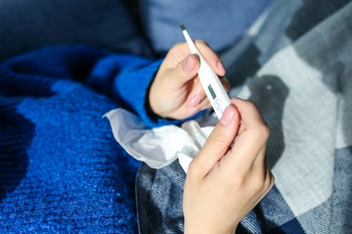Did you notice that fevers get worse at night? That is actually not your imagination or suggestion at all. It is supported by scientific concepts. So our hypothalamus, a small region in our brains, is responsible for thermoregulation. That is a mechanism to keep our body core temperature around 37°C. However, when we have an infection or inflammation the hypothalamus will reset the core temperature to be higher than 37°C. This is what we call as fever. So why does fever get worse at night? There are at least 3 reasons for it.
The first reason is the human circadian rhythm or body clock. Naturally, thanks to the circadian rhythm, the human body temperature is at its lowest point in the morning and reaches the highest point at night (Morf & Schibler, 2013). Even when we have a fever, this cycle is still working. This results in elevating the already elevated temperature.
The second reason is the cycle of the immune system. Our immune system works differently day and night. It is in attack mode during the day but in rest mode when the night comes. It engulfs and kills pathogens at day. However, at night it produces cortisol hormone that increases inflammation to limit the infected area (Scheiermann, Kunisaki, & Frenette, 2013). This increasing inflammation followed by elevated temperature.
The third reason is that there is less distraction at night. We can just go about our day doing a lot of activities. However, when the distraction is not there at night we become more aware of what we feel. This includes fever (Heid, 2019). So those are why we feel the fever gets worse at night
Referensi
Heid, M. (2019, February 6). Here’s Why You Always Feel Sicker at Night. Retrieved from TIme: https://time.com/5521313/why-you-feel-sicker-at-night/
Morf, J., & Schibler, U. (2013). Body temperature cycles Gatekeepers of circadian clocks. Cell Cycles, 12(4), 539-540. doi:10.4161/cc.23670
Scheiermann, C., Kunisaki, Y., & Frenette, P. S. (2013). Circadian control of the immune system. Nature Reviews Immunology, 13(3). doi:10.1038/nri3386
Oleh
Rossy Andini Herindra Putri









